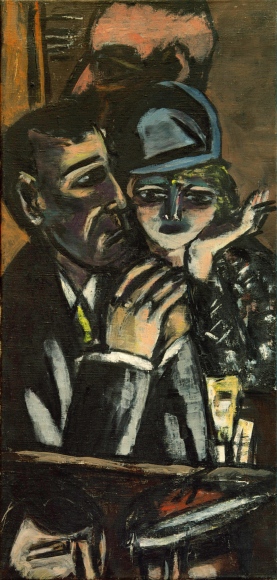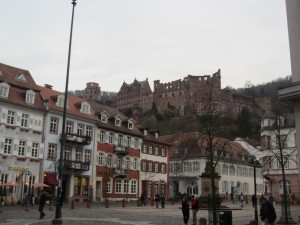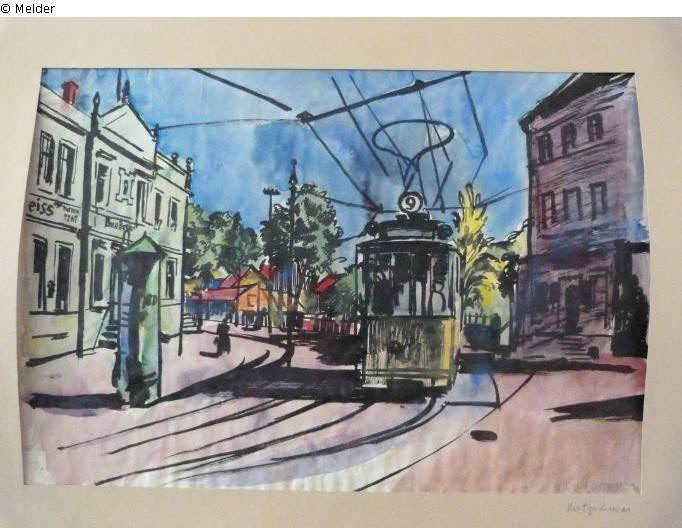As if the Cornelius/Hildebrand Gurlitt saga needed any more complications as the world awaits the official decision by the Kunstmuseum Bern about whether to accept the appointment as Cornelius Gurlitt’s heir, even more artwork has apparently turned up. Der Spiegel, the Frankfurter Allgemeine Zeitung, and the Wall Street Journal have reported that one picture and several sculptures in the very apartment from which the original trove was seized more than two years ago. Among the sculptures are apparently a Degas and a Rodin. Nothing else seems known about the works or their ownership history, or whether they might be among works that Hildebrand Gurlitt sold or acquired as "degenerate" (side note: the Victoria and Albert Museum's copy of the Degenerate Art Action register is currently on display in New York at the Neue Galerie's exhibition of that title. While it is available online, it is most certainly worth a visit before the show ends).
Curiouser and Curiouser: Still More Gurlitt Paintings Found, Nazi-Looting Connections Unknown
Topics: Frankfurter Allgemeine Zeitung, Victoria and Albert Museum, Rodin, Cornelius Gurlitt, Schwabinger Kunstfund. Kunstfund München, Gurlitt Task Force, Fall Gurlitt, Gurlitt Collection, Degas, Hildebrand Gurlit, Entartete Kunst, Gurlitt, Restitution, Bavaria, Neue Galerie, Der Spiegel, Wall Street Journal, World War II, Degenerate Art Action, degenerate art, Kunstmuseum Bern, www.lostart.de, Nazi art, Raubkunst
Augsburg Prosecutor Rejects Idea of Making Deal with Gurlitt, Harvard and LACMA Beckmann Paintings Highlight Difficulty Ahead Without Agreement
Just days after attorneys for Cornelius Gurlitt floated the idea of discussions with survivors and heirs for a possible resolution to the questions about the artworks found in his apartment two years ago that are suspected of having been stolen or sold under duress during the Nazi era (and after the prosecutor was ordered to make a full list available to journalists), the prosecutor in charge of the investigation categorically rejected the possibility of any deal with Gurlitt.
Topics: Erhard Göpel, Frankfurter Allgemeine Zeitung, Stuttgart, Wiesbaden, FAZ, Focus, Hildebrand Gurlitt, Cornelius Gurlitt, Augsburg, Amsterdam, Willi Korte, Schwabinger Kunstfund. Kunstfund München, Marvin Fishman, Reinhard Nemetz, Gurlitt Task Force, Germany, Fall Gurlitt, The Art Newspaper, Gurlitt Collection, Max Beckmann, Karl Buchholz, Robert Looker, Entartete Kunst, Bar Braun, Beutekunst, Schwabing, Magdeburg, LACMA, Ersessene Kunst, Harvard, Gurlitt, Bavaria, Busch-Reisinger, Los Angeles County Museum of Art, degenerate art, the Central Collecting Point, Augsburger Staatsanwalt, www.lostart.de, Nazi art, Sotheby's, Roman Norbert Ketterer, Raubkunst, Verjährung, Mayen Beckmann, National Gallery Berlin, verschollene Kunst, De-Nazification, Selbstbildnis, Self Portrait
Cornelius Gurlitt’s Lawyers File Privacy Complaint
In one of the first affirmative steps taken by Cornelius Gurlitt since the revelation of the seizure of a large number of artworks with possible Nazi-seizure connections, Gurlitt has filed a criminal complaint concerning his allegations of violations of his privacy rights. According to Gurlitt’s attorney, “The surrender of investigative information to the press, and with it the severe damage to his personal rights is not tolerable in any way for Mr. Gurlitt. . . . This is a blatant violation of official secrecy.” Another of his lawyers went on to express concern for trust in the process in which details were being given to the media. In particular, Gurlitt’s team were most upset about photographs in the Focus piece that broke the story of Gurlitt’s apartment.
Topics: Stuttgart, Das Alte Schauspielhaus, Cologne, Irina Alter, veschollene Kunst, Schwabinger Kunstfund, Wiedergutmachung, Annette Weber, Hildebrand Gurlitt, Cornelius Gurlitt, Corinna Budras, S. Lane Faison, Universität Heidelberg, Augsburg, Institute for Jewish Studies Heidelberg, Aryanization, Anat Feinberg, Willi Korte, Schwabinger Kunstfund. Kunstfund München, Monuments Man, Gurlitt Task Force, Germany, Fall Gurlitt, Köln, Nazi-looted art, Henry Keazor, Gurlitt Collection, Appropriated Art the Gurlitt Case, Kurpfälzisches Museum Heidelberg, Hochschule für Judische Studien Heidelberg, Eberhard Karls-Universität Tübingen, Emily Löffler, CSU, Williams College, Judische Allgemeine, Hildebrand Gurlit, Entartete Kunst, Universität Zürich, Arisierung, Lehrstuhl für Römisches Recht und Privatrecht, Nürnberger Institut, Rückgabe, Rhein-Neckar Morgenweb, Beutekunst, 'Stürmer-Bibliothek', Magdeburg, Daniel Krochmalnik, Ersessene Kunst, Katja Terlau, Art Loss Recovery Unit, Jim Tobias, Rhein-Neckar Zeitung, Fritz Backhaus, Gurlitt, Bavaria, Johannes Heil, Wien, Sullivan & Worcester LLP, Lucas Elmenhorst, Kunsthistorisches Institut, Nürnberg, Jüdisches Museum Frankfurt, Looted Art, „Sturmer-Library“, degenerate art, Boston, Seminar für Neuere Geschichte, Wolfgang Ernst, www.lostart.de, Nazi art, Raubkunst, Nicholas M. O'Donnell, Frieder Hepp, Verjährung, Vienna, Münchner Kunstfund, New York, FAZ Frankfurt, Felicitas Heiman-Jellinek
Gurlitt Attorney Speaks of Discussions with Heirs and “Fair and Equitable Solution,” Challenges Earlier Quote Despite Video of Interview
One of Cornelius Gurlitt’s attorneys, Hannes Hartung, told the Wall Street Journal last week, and was again quoted in the Frankfurter Allgemeine Zeitung yesterday, that Gurlitt was open to possible resolutions to claims from heirs to the paintings found in his apartment in 2012. According to Hartung, Gurlitt is already in talks with heirs, and wants a “fair and equitable solution.” 
Topics: Frankfurter Allgemeine Zeitung, Ich geb' nichts freiwillig zurück, FAZ, veschollene Kunst, Focus, Hannes Hartung, Cornelius Gurlitt, Schwabinger Kunstfund. Kunstfund München, Fall Gurlitt, The Art Newspaper, Gurlitt Collection, Max Beckmann, Hildebrand Gurlit, Entartete Kunst, Bar Braun, Özlem Gezer, Beutekunst, LACMA, Gurlitt, David D’Arcy, Der Spiegel, Wall Street Journal, Los Angeles County Museum of Art, degenerate art, Raubkunst
Recap of Ersessene Kunst—Der Fall Gurlitt (Appropriated Art—The Gurlitt Case): January 26, 2014 in Heidelberg
I’ve just returned from my presentation in Heidelberg at the Hochschule für Jüdische Studien in Heidelberg at the conference Ersessene Kunst—Der Fall Gurlitt; Appropriated Art—The Gurlitt Case. The presentations were, without exception, outstanding. They ranged from rarely-told case stories, to sharp insights of some of the overarching principles that guide the the Gurlitt case and similar events. As the discussions made clear, this case will not be easily resolved. That in turn makes recent reports that Cornelius Gurlitt has indicated a willingess to discuss the art's return all the more significant.
Topics: Maria Altmann, Leopold Reidemester, Ministerin für Justiz und Kultur, Stuttgart, Das Alte Schauspielhaus, Cologne, Irina Alter, Portrait of Adele Bloch-Bauer, veschollene Kunst, Focus, Schwabinger Kunstfund, Aschbach Castle, Mussolini, Wiedergutmachung, Annette Weber, Monte Cassino, Cornelius Gurlitt, Corinna Budras, S. Lane Faison, Breslau, Universität Heidelberg, Augsburg, Aryanization, Anat Feinberg, Willi Korte, Schwabinger Kunstfund. Kunstfund München, Monuments Man, Jud Süss, Wrocław, Dresden, Gurlitt Task Force, Germany, Silesia, Fall Gurlitt, Wallraf-Richartz Museum, Köln, Nazi-looted art, Henry Keazor, Gurlitt Collection, Appropriated Art the Gurlitt Case, Schloss Aschbach, Die Welt, Kurpfälzische Museum Heidelberg, Hochschule für Judische Studien Heidelberg, Karl Haberstock, Eberhard Karls-Universität Tübingen, Emily Löffler, CSU, Williams College, Hildebrand Gurlit, Entartete Kunst, Universität Zürich, Arisierung, Lehrstuhl für Römisches Recht und Privatrecht, Württemberg, Schlesien, Nürnberger Institut, Hamburg, Otto Förster, Rückgabe, Beutekunst, 'Stürmer-Bibliothek', Magdeburg, Portrait of Amalie Zuckerkandl, Ersessene Kunst, Katja Terlau, Art Loss Recovery Unit, Jim Tobias, Hermitage, Gurlitt, Bavaria, Johannes Heil, Wien, Sullivan & Worcester LLP, Lucas Elmenhorst, Events, Kunsthistorisches Institut, Nürnberg, Jüdisches Museum Frankfurt, Looted Art, „Sturmer-Library“, degenerate art, Seminar für Neuere Geschichte, Wolfgang Ernst, Justizminister, Göring, www.lostart.de, Nazi art, Raubkunst, Nicholas M. O'Donnell, Frieder Hepp, Verjährung, Vienna, Claudius Krausharr, Münchner Kunstfund, Zwickau, Kajetan Mühlmann, New York, Werner Haftmann, FAZ Frankfurt, Felicitas Heiman-Jellinek
Bavaria to Review Draft Revision to Statute of Limitations on Claims to Art Found in Gurlitt Apartment
Die Welt reports today that a scheduled cabinet meeting of the government of Bavaria includes discussion of a draft revision to the state’s statute of limitations. Justice Minister Winfried Bausback (CSU) has apparently stated his desire to ensure that claimants like those heirs to owners of works found in Cornelius Gurlitt’s apartment will not be barred by the statute of limitations, following through on statements he made last year after being selected. There has been lively discussion of whether such claims would be time barred, but this revision would presumably be intended to answer the question broadly. It could signal the beginning of legislative steps to address the situation. The previous Justice and Culture Minister Beate Merk had come under heavy criticism, but a new minister may have room to make some changes. And, in a parliamentary system, the consensus of the ruling government is more significant in anticipating the passage of legislation.
Topics: Ministerin für Justiz und Kultur, Legal Tribune, veschollene Kunst, Beate Merk, Cornelius Gurlitt, Augsburg, Schwabinger Kunstfund. Kunstfund München, Gurlitt Task Force, Germany, Fall Gurlitt, Gurlitt Collection, Die Welt, Lorenz Kähler, CSU, Hildebrand Gurlit, Entartete Kunst, Ingeborg Berggreen-Merkel, Beutekunst, Magdeburg, Gurlitt, Bavaria, degenerate art, Freistaat Bayern, Justizminister, www.lostart.de, Nazi art, Raubkunst, Verjährung, Winfried Bausback
Gurlitt Vows to Fight for Art Collection, Possible Limitations Under German Law Still Unclear. Does Austria Have Say?
Der Spiegel conducted a face to face interview with Cornelius Gurlitt that was published over the weekend, addressing his intentions about the 1,400 artworks connected to Nazi looting. Most striking was Gurlitt’s declaration with regard to the artworks seized by Bavarian tax authorities “I will give nothing back willingly.” The highlights of the interview, available in both German and English (the fuller version only in print, in German), ranges from discussing Gurlitt’s reclusive existence, to his perceived victimhood, to some standard-fare denialism (like that Hildebrand engaged in the commerce of “degenerate art” nearly always sold under duress or worse only in order to “save” the art).
Topics: veschollene Kunst, Cornelius Gurlitt, Schwabinger Kunstfund. Kunstfund München, Verjährungsfrist, Legal Times, prescriptive ownership, Gurlitt Collection, österreiches Recht, Bundesgerichtshof, Hildebrand Gurlit, Entartete Kunst, Nazis, Munich, Salzburg, Gurlitt, Restitution, City of Gotha et al. v. Sotheby’s et al., Statute of Limitations, Looted Art, World War II, deutches Recht, degenerate art, Austria, München, Raubkunst, German Civil Code § 221, Österreich
Gurlitt Taskforce Announces Plan to Post 590 More Works. Choice of Law, Procedure, and Venue for Claims Up in the Air
Ingeborg Berggreen-Merkel, leader of the newly formed federal “Schwabing Art Find” taskforce, announced plans to release information about 590 additional works found in the apartment of Cornelius Gurlitt, after the posting earlier this week of 25 works at www.lostart.de. Meanwhile, the heirs of Max Ernst have publicly disclosed (through their attorney Jürgen Wilhelm in Cologne) their claim to certain of the works in the Gurlitt find. The federal authorities appear to be gaining the upper hand for disclosure against the tax investigators in Bavaria who initially seized the collection, which was not a foregone conclusion.
Topics: Cologne, veschollene Kunst, the Lion Tamer, Lempertz, Cornelius Gurlitt, Schwabinger Kunstfund. Kunstfund München, Max Liebermann, Köln, Gurlitt Collection, Foreign Sovereign Immunities Act, Hildebrand Gurlit, Entartete Kunst, Nazis, Ingeborg Berggreen-Merkel, Hermann Goring, Michael Hulton, FSIA, Gurlitt, Restitution, conversion, Looted Art, World War II, degenerate art, Altmann v. Republic of Austria, Löwenbändiger, Raubkunst, Alfred Flechteim, Jürgen Wilhelm, Max Ernst





